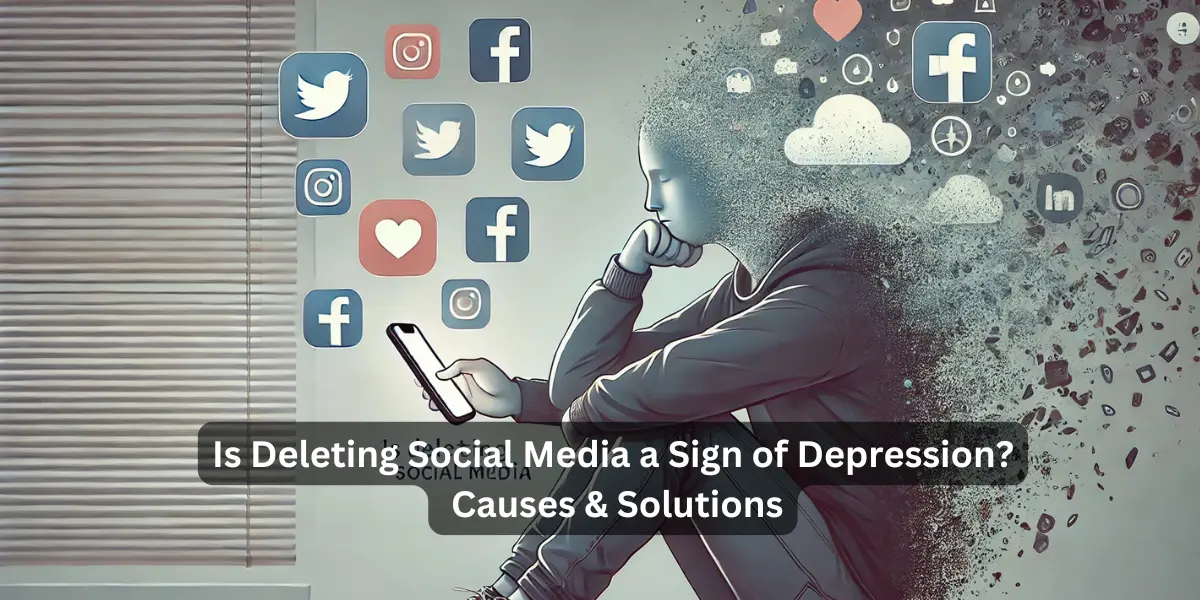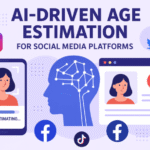
Is Deleting Social Media a Sign of Depression? Causes & Solutions
Social media is now a vast part of our lives, helping us reach out to friends, family members, and even strangers who are all around the world. It is a fun and helpful medium for communicating to most people, but for others, too much time spent on these social media leaves people with feelings of stress, anxiety, or unhappiness. For some, it even goes up to the point of deleting social media accounts. This raises the question: Is Deleting Social Media a Sign of Depression? In this discussion, we talk about the following:
Table Of Content
- Understanding Depression and its symptoms
- Reasons of Deleting Social Media
- How to Set Boundaries when using Social Media
Understanding Depression and its Symptoms
Depression is such a serious mental disorder that it fundamentally influences mood, thoughts, and life. Unlike transient sadness, depression is marked by low mood or a total lack of interest in activities along with physical symptoms like fatigue, sleep problems, and others. All these signs must not be overlooked so individuals affected may look out for some help and support.
Common signs of depression are:
- Persistent Depressed Mood: Portrayed by the feeling of either being sad, empty, or hopeless most of the time.
- Loss of Interest in Activities or Feeling Pleasure: One gives up hobbies or social activities he or she enjoyed almost every day.
- Not Here and Gone but Actually Coming: Sometime one begins to gain or lose their eating habits as an apparent change in their weight.
- Sleep Aversion: One experiences difficulty in sleeping, staying asleep, or even sleeping excess.
- Fatigue or Low Energy: Always feeling drained, even after resting, and cannot carry out daily activities.
- Feeling of Guilt or Worthlessness: Feeling burdensome, blaming yourself, or worthless.
- Intolerance of Activities: Inability to focus, inability to remember things, and inability to make decisions.
- Physical: Unexplained body aches, pains, headaches, or poor digestive systems.
- Withdrawn or Isolation: Avoiding social engagements or withdrawal from friends and family.
- Ideas of death or suicide: Recurring thoughts about death, dying, suicide, or self-injury.
Reasons of Deleting Social Media
Some of the most common reasons why a person might delete their social media account are:
- Privacy: Worry about collecting data, privacy, and security of information.
- Mental Health: Reducing stress, anxiety, or feelings of inadequacy from constant comparison or negative interactions.
- Desire for a Digital Detox: Want to stay disconnected and concentrate on the real world instead of getting bogged by digital distractions?
- Time Management: To stop wasting time from doing things online and focus on more productive things in life.
- Getting out from online negativity or abusive online relationships.
- Feeling overburdened by the pressure to share constantly and to keep one’s online identity.
- Prioritizing mental health, studies, career, or personal projects without getting distracted by social media.
- Anti-social media culture
- A dislike towards the superficial environment and people, misinformation, or toxic presentation in social media.
- Life Changes: Often, this might be brought about by something such as moving to a new life with a family or a new job, and the desire to start anew.
How to Set Boundaries when using Social Media
Here are some coping techniques for positive social media use:
- Define time limits: In-built timers or applications may define specific limits on daily social media usage.
- Unfollow negative accounts: Follow people or pages that make you feel positive, or unfollow or mute accounts that lead to comparison, stress, or negativity.
- Schedule social media breaks: Take regular breaks like the weekends or evening off in order to sort things and regain focus in relationships in real life.
- Pay attention to your feelings: Observe how you feel while using social media.If you are anxious or sad; just step back.
- Monitor your feeds with positive training and uplifting content that heals your mood.
- Limit notifications: Disable all unnecessary notifications to break the live pounding for checking constantly.
- Set Purposive Goals: Before you even open an application, know what you want to do, like check messages, read news, etc., so you’re not just scrolling mindlessly.
- Focus on Real-Life Connections: Make sure you hit that balance by focusing on face-to-face connections and offline activities for the sake of fulfillment.
- Practice the Art of Digital Detoxes: Set aside days or hours where you stay away from social media altogether for renewal.
With these strategies, you can develop a healthier relationship with social media, reducing stress while being able to enjoy the advantages.
Conclusion: Is Deleting Social Media a Sign of Depression?
In conclusion, the deletion of social media itself does not indicate an individual is depressed; most people do it for privacy purposes or other personal reasons. However, besides other withdrawal symptoms and loss of interest, it can be an indicator of depression indeed. It is quite essential to see the big picture while considering someone’s behavior and mood. If it comes with other changes, it’s probably time to check in or encourage someone to seek support from a professional in the mental health department.
Frequently Asked Questions
Deletion of social media helps create a culture that, in return, reduces the stress, anxiety, and bad comparison situations. However, differences may emerge since some become highly isolated; then again, the best solution in most cases is to find a form of balance.
It’s not necessarily bad, dropping social media-from a privacy or mental wellness standpoint could be a healthy choice. But in the context of withdrawal or isolation, some possible underlying mental health struggles might be at play.
Social media contributes to depression when it creates such a comparative view, anxiety, or feeling of inadequacy. It can cause increased levels of stress due to excessive exposure to such content, but it always depends on the circumstances and health of the individual.




